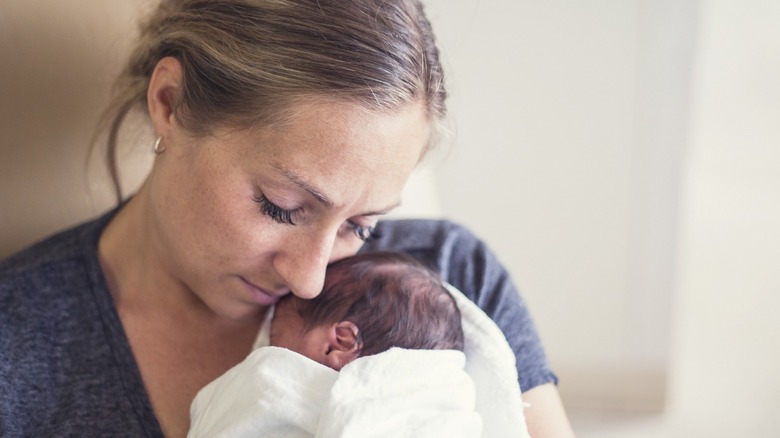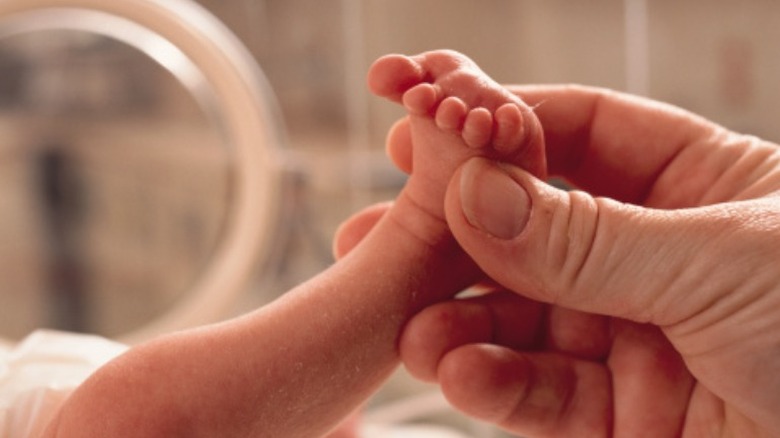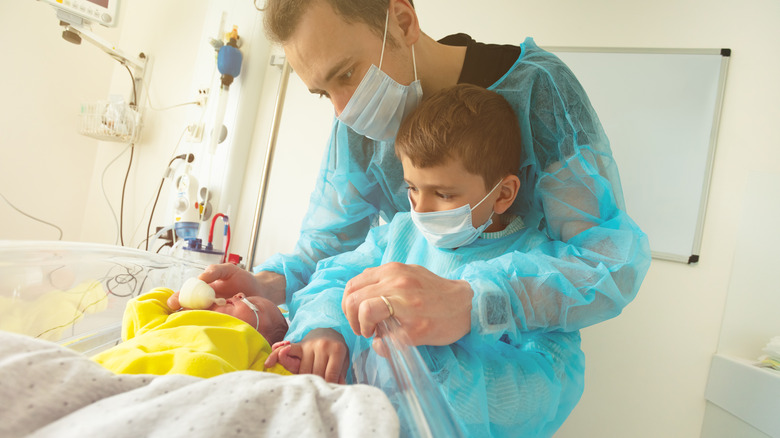Neonatologist Lists The Dos And Don'ts For Friends And Family Of NICU Parents
Birth is the miracle of life, but it does not always go off without a hitch. According to Stanford Medicine Children's Health, the neonatal intensive care unit, or NICU, is the intensive care unit for newborn babies. Once born, babies must breathe on their own using their lungs, digest food, and get rid of waste, and the immune system and liver now work without the support of the mother. There are many reasons a baby could need intensive care after birth. For example, the newborn may have issues breathing, heart problems, develop an infection, have a low birth weight, or even have a birth defect.
As a parent, having to take a trip to the NICU can be difficult. The emotions that can be triggered can range from anxiety to anger to guilt to helplessness. Be patient with yourself and how you feel, no one would expect you to not have big feelings about it. One thing that will help is to check in with the NICU team that's taking care of your baby. They're also there to help you, so don't hesitate to ask questions.
Nevertheless, this might make you wonder what the best practices are for friends and family and how they should comport themselves during such a difficult time for the NICU parents. Luckily, in an exclusive interview, Health Digest spoke with Dr. Melinda Elliott, neonatologist and chief medical officer of Prolacta Bioscience, to share the dos and don'ts for family and friends.
How to help
The first thing you can do is offer support, according to Dr. Elliott. "Recognize NICU parents are stressed and overwhelmed," says Dr. Elliott. "Ask how you can help, by bringing meals and assisting with errands and household chores or offer to help with carpooling or babysitting their other children." It's important to listen or provide a shoulder to cry on. "You can also offer to go with them when talking with the doctor as another 'set of ears' to hear what is said," suggests Dr. Elliott. "It's hard to hear everything when under the stress of having your baby in the NICU. Close friends and family can sometimes help parents better remember what was said and understand what is happening with their baby."
Another concrete thing that you can do is to help put together a bag for them to have at the hospital. Dr. Elliott recommends the list put together by Hand to Hold, which includes things like hand lotion, healthy snacks, a heating pad for your neck, gift cards to nearby restaurants, a shawl, and a phone charger. Dr. Elliott echoes the suggestion for a phone charger so you're not left without any battery if or when you need to check in with loved ones, And while it may seem like time in the NICU isn't time you want to remember, Dr. Elliott recommends parents remember to take pictures since "babies change so quickly!"
What to avoid
When it comes to the don'ts, there's not too much to worry about as long as you're being supportive. However, just try not to overstep. In other words, "Don't try to solve the problem of the baby needing NICU care because you can't solve that," shares Dr. Elliott. You don't want to ask the parents when the baby is coming home or guarantee that everything will be fine because you simply don't know. "A premature baby's status can change from day to day, even hour to hour," continues Dr. Elliott. "Even when a baby is doing well, they have to clear a number of hurdles before they can leave the NICU."
All in all, most friends and family should remember to be sensitive to the parent's situation and their needs. After all, sometimes the best support is to just listen and help them offload the emotional weight of it all.


